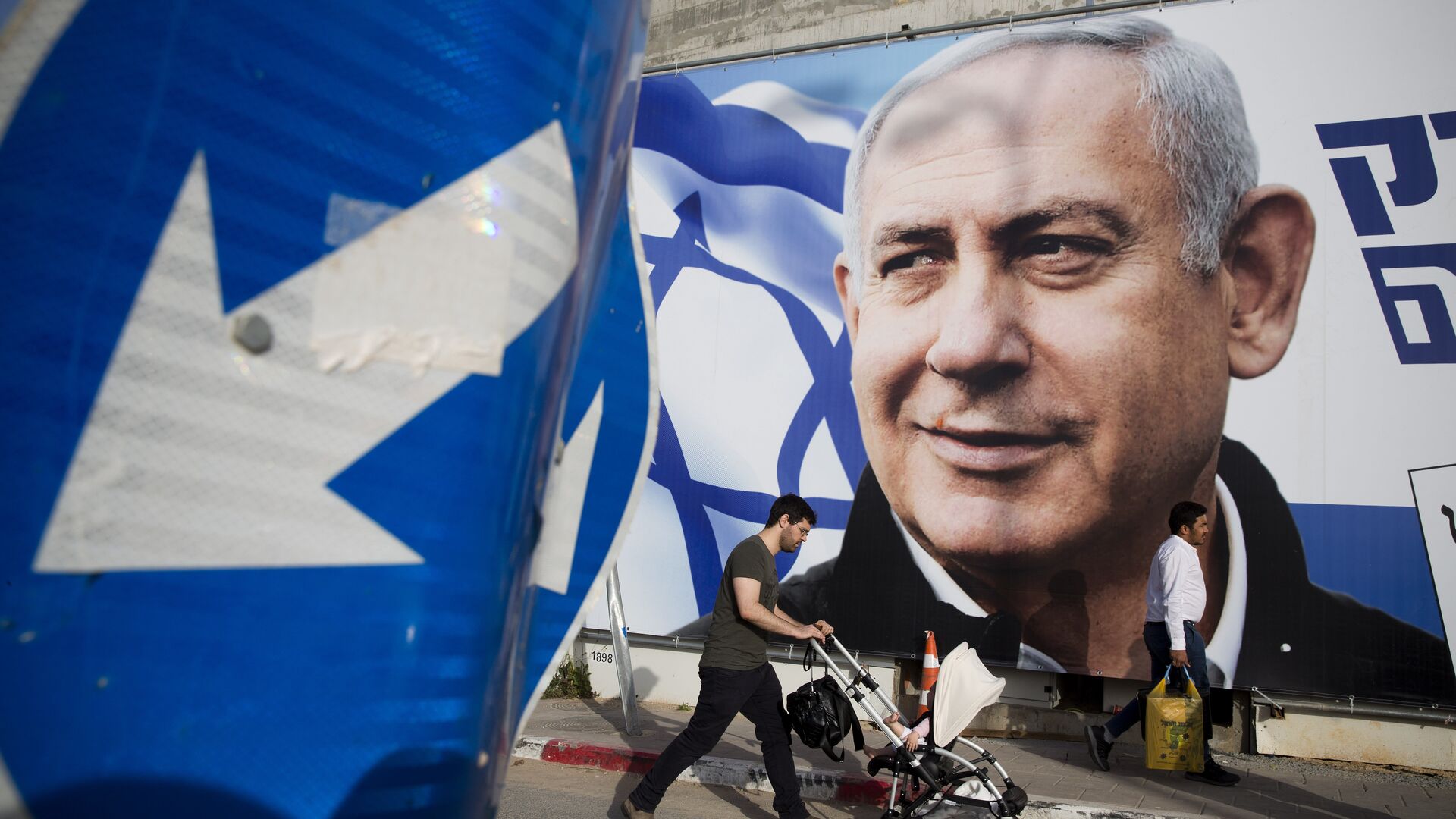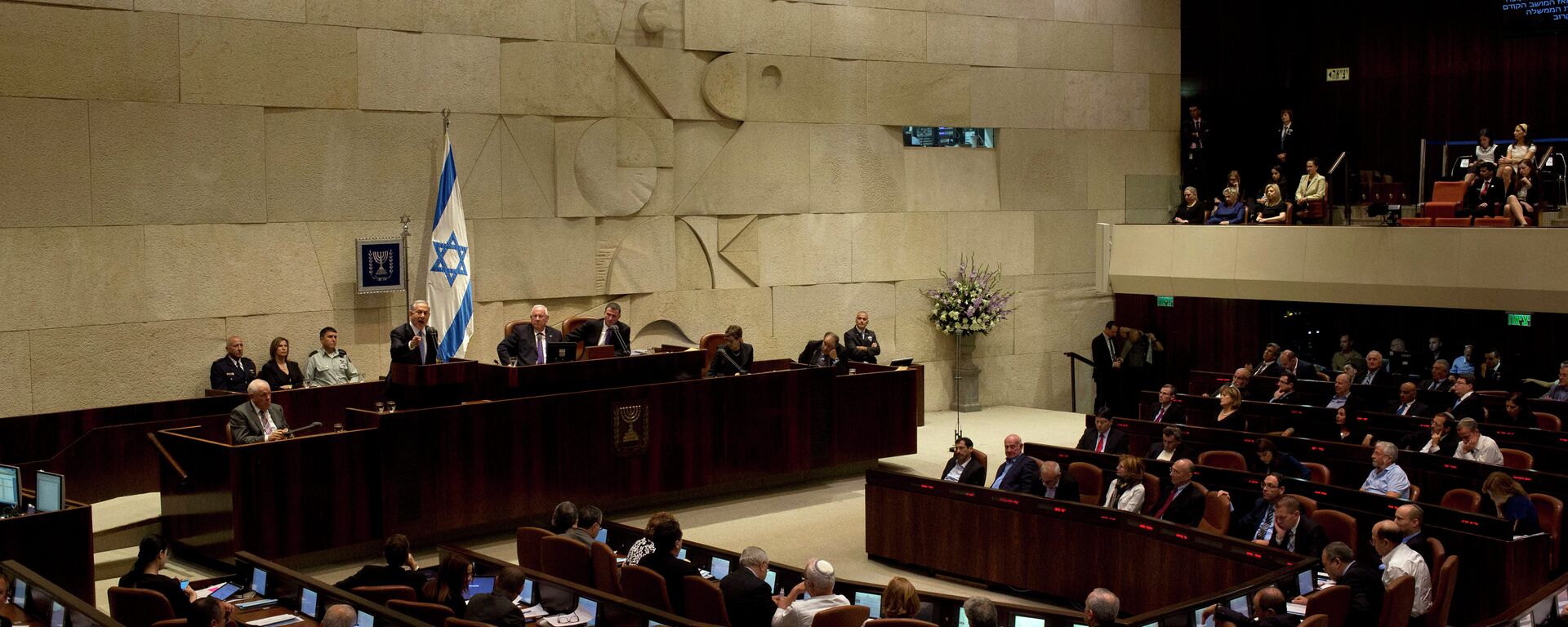https://sputnikglobe.com/20220626/netanyahu-throws-likud-ally-under-the-bus-after-he-proposes-including-arab-party-in-coalition-1096682009.html
Netanyahu Throws Likud Ally Under the Bus After He Proposes Including Arab Party in Coalition
Netanyahu Throws Likud Ally Under the Bus After He Proposes Including Arab Party in Coalition
Sputnik International
Israel’s ruling coalition requested fast-tracking a measure to disperse the Knesset on Sunday, with the legislation expected to be voted on on Monday, and... 26.06.2022, Sputnik International
2022-06-26T18:21+0000
2022-06-26T18:21+0000
2023-01-15T17:26+0000
benjamin netanyahu
israel
https://cdn1.img.sputnikglobe.com/img/107391/55/1073915528_0:300:5760:3540_1920x0_80_0_0_326dbe4633c751ad0ee9744b934ba734.jpg
Former prime minister Benjamin Netanyahu has dismissed any scenario under which the moderate Islamist, social conservative United Arab List (UAL) party could be part of a Likud coalition government after a senior ally spitballed the possibility.“Ra’am is an anti-Semitic, anti-Zionist party that supports terrorism and represents the Muslim Brotherhood, which seeks to destroy Israel. The Likud under my leadership has never agreed and will never agree to include Ra’am in any coalition,” Netanyahu said in a statement Sunday, using the Hebrew language acronym for the UAL.Likud echoed the former PM’s comment in its own statement. “The remarks were made contrary to the position of, and are not the opinion of former prime minister Netanyahu. Netanyahu has never agreed and will never agreed to include Ra’am in his coalition,” Likud said.The statements came after David Amsalem, a Netanyahu ally and senior Likud lawmaker, said that the Arab party could be part of a conservative coalition, but only if it couldn’t play the role of kingmaker.After Netanyahu responded, Amsalem accused the former prime minister personally of “trying to hurt” him by publicly rebuking his comments on the Islamist Party’s coalition prospects, and said he was “shocked” when Netanyahu did not call him to discuss the matter. “This is not the first time he has done this,” the lawmaker said.Defense Minister Benny Gantz took to Twitter to defend the UAL for its “important and courageous” work “toward bringing Jewish and Arab citizens of the state of Israel closer together,” and attacked Netanyahu over his claim that the Arab party was “anti-Semitic,” calling the allegation “outrageous.”Holding four seats in the parliament, the UAL is part of the Naftali Bennett government alongside Yesh Atid, Blue and White, Yamina, Labor and others. The party made history last June by joining the Bennett government in exchange for promises of billions of dollars for assistance to improve infrastructure and policing in Arab majority areas, new protections against the demolition of Arab villages, and money to improve job opportunities and healthcare for Israeli Arabs. The minority makes up about 21 percent of Israel’s population, but has a series of deep-seated grievances against the Jewish majority, which mandates Israel’s status as a Jewish state at the constitutional level.Abbas previously revealed that Netanyahu had approached him in 2021 to propose forming a coalition, but that the deal fell through after Netanyahu’s allies to Likud’s right rejected the idea. Earlier this month, the politician said he would be willing to consider joining a coalition with Likud if the current government collapses.Bennett’s shaky coalition edged toward collapse last week after a key lawmaker quit, leaving the government with an untenable minority in the Knesset. Last week also saw an attempt to propose amending Israel’s Basic Laws to prevent politicians like Netanyahu who have been indicted for serious crimes from serving as prime minister. Netanyahu is charged for breach of trust, bribery and fraud charges, and would face up to ten years behind bars if convicted. The 72-year-old has dismissed the charges.After Monday’s expected passing of legislation to confirm its dispersal, elections are expected to take place in late October or early November, with pollsters predicting a political deadlock echoing the crisis of 2019-2021, which saw Israelis go to the polls for three consecutive national elections without Likud or its opponents being able to form a stable coalition government.
https://sputnikglobe.com/20220622/israels-parliament-passes-bill-to-dissolve-itself-in-preliminary-reading-1096565180.html
https://sputnikglobe.com/20220623/israeli-elections-will-change-nothing-for-palestinians-as-politicians-all-the-same-says-pundit-1096585746.html
israel
Sputnik International
feedback@sputniknews.com
+74956456601
MIA „Rosiya Segodnya“
2022
News
en_EN
Sputnik International
feedback@sputniknews.com
+74956456601
MIA „Rosiya Segodnya“
Sputnik International
feedback@sputniknews.com
+74956456601
MIA „Rosiya Segodnya“
benjamin netanyahu, israel
benjamin netanyahu, israel
Netanyahu Throws Likud Ally Under the Bus After He Proposes Including Arab Party in Coalition
18:21 GMT 26.06.2022 (Updated: 17:26 GMT 15.01.2023) Israel’s ruling coalition requested fast-tracking a measure to disperse the Knesset on Sunday, with the legislation expected to be voted on on Monday, and Foreign Minister Yair Lapid to take over in the middle of next week and run the country as caretaker prime minister until elections in the fall.
Former prime minister Benjamin Netanyahu has dismissed any scenario under which the moderate Islamist, social conservative United Arab List (UAL) party could be part of a Likud coalition government after a senior ally spitballed the possibility.
“Ra’am is an anti-Semitic, anti-Zionist party that supports terrorism and represents the Muslim Brotherhood, which seeks to destroy Israel. The Likud under my leadership has never agreed and will never agree to include Ra’am in any coalition,” Netanyahu
said in a statement Sunday, using the Hebrew language acronym for the UAL.
Likud echoed the former PM’s comment in its own statement. “The remarks were made contrary to the position of, and are not the opinion of former prime minister Netanyahu. Netanyahu has never agreed and will never agreed to include Ra’am in his coalition,” Likud said.
The statements came after David Amsalem, a Netanyahu ally and senior Likud lawmaker, said that the Arab party could be part of a conservative coalition, but only if it couldn’t play the role of kingmaker.
“If Mansour Abbas [leader of the UAL] wants to join after we have 61 seats, then welcome,” Amsalem said earlier in the day Sunday in an interview with Channel 12. “But we cannot rely on him. The Jews currently cannot rely on an anti-Zionist party,” Amsalem said. “We said it all the time. A government should have a Zionist majority. After we have a Zionist majority, if anyone else wants to [join], I have no problem with that.”
After Netanyahu responded, Amsalem
accused the former prime minister personally of “trying to hurt” him by publicly rebuking his comments on the Islamist Party’s coalition prospects, and said he was “shocked” when Netanyahu did not call him to discuss the matter. “This is not the first time he has done this,” the lawmaker said.
Defense Minister Benny Gantz
took to Twitter to defend the UAL for its “important and courageous” work “toward bringing Jewish and Arab citizens of the state of Israel closer together,” and attacked Netanyahu over his claim that the Arab party was “anti-Semitic,” calling the allegation “outrageous.”
Holding four seats in the parliament, the UAL is part of the Naftali Bennett government alongside Yesh Atid, Blue and White, Yamina, Labor and others. The party made history last June by joining the Bennett government in exchange for promises of billions of dollars for assistance to improve infrastructure and policing in Arab majority areas, new protections against the demolition of Arab villages, and money to improve job opportunities and healthcare for Israeli Arabs. The minority makes up about 21 percent of Israel’s population, but has a series of
deep-seated grievances against the Jewish majority, which mandates Israel’s status as a Jewish state at the constitutional level.
Abbas previously revealed that Netanyahu had approached him in 2021 to propose forming a coalition, but that the deal fell through after Netanyahu’s allies to Likud’s right rejected the idea. Earlier this month, the politician said he would be willing to consider joining a coalition with Likud if the current government collapses.
Bennett’s shaky coalition
edged toward collapse last week after a key lawmaker quit, leaving the government with an untenable minority in the Knesset. Last week also saw an attempt to propose amending Israel’s Basic Laws to prevent politicians like Netanyahu who have been indicted for serious crimes from serving as prime minister. Netanyahu is charged for breach of trust, bribery and fraud charges, and would face up to ten years behind bars if convicted. The 72-year-old has dismissed the charges.
After Monday’s expected passing of legislation to confirm its dispersal, elections are expected to take place in late October or early November, with pollsters
predicting a political deadlock echoing the crisis of 2019-2021, which saw Israelis go to the polls for three consecutive national elections without Likud or its opponents being able to form a stable coalition government.





